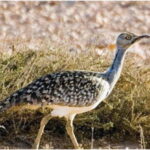In October 2016, PM Nawaz Sharif approved creation of an endowment fund for migratory birds including the MacQueen’s bustard – also known as the Asian houbara. The fund will initially be capitalised by the finance division with a Rs 250 million allocation, and will be augmented through additional resources in the future.
“The endowment fund was designed to provide a lasting solution for conservation and habitat protection of migratory birds in Pakistan,” PM’s Focal Person on Green Pakistan Program (GPP) Rizwan Mehboob said. He said it would develop conservation, propagation and artificial breeding initiatives for bustards and other migratory birds, manage and restore migratory bird habitats, such as protected areas and conservancies, protect endangered species of migratory birds, their habitats and ecosystems, and support wildlife management and security operations by provincial governments. He added that it would also facilitate community-based participatory wildlife management and benefit apportionment initiatives while supporting research, censuses, knowledge product development, and communication activities for the benefit of promoting and propagating the cause of migratory bird conservation and scientific management.
Javed Ahmed Mahar, a wildlife conservator in Sindh, said the establishment of the endowment fund was encouraging, while also stressing on capacity building of wildlife departments with respect to anti-smuggling operations across provincial as well as international borders, besides promulgation of anti-poaching laws at federal level under CITES and the trade control act, and establishing wildlife counters at all exit routes.
“The sea route is a favorite of smugglers and proper watch must be kept on it,” He said. He added that bustards were not as threatened by falconry as they were by poaching and smuggling.
He said that in Sindh and Balochistan, habitat loss was due to petroleum sector development. He said bustards were now available for sale from poachers for Rs30,000 to Rs45,000.
Mahar said petroleum companies have made extensive network of gravel roads in deserts, which badly damaged bustard habitats. He claimed that they never implemented environment management plans (EMP) and this could be addressed easily using funds from their respective corporate social responsibility (CSR) operations.
Ministry of Climate Change Biodiversity Director Naem Ashraf Raja said, “We must consider both biological and social sustainability before venturing in to any program for conservation of migratory birds and stressed to be conservative before starting any sustainable use initiative. He said that the rate of population decline of bustards was approaching levels that would qualify for classification as an endangered species.
He said that the review of the global conservation status of the Asian houbara reports a population of between 79,000 and 97,000 individuals globally.
Raja said that the population of Asian houbara had been in steady decline since the early 20th century and overexploitation remained the foremost threat to the species, primarily as a result of unsustainable levels of hunting and poaching.
The number of birds migrating from Siberia has also declined drastically in recent years.
Many birds fly south to India to escape the harsh Russian winter, but on their way, they make stopovers at different lakes and water reservoirs in Pakistan, including Tanda Dam in Kohat, and Haleji, Keenjhar and Lungsee lakes in Sindh.
A WWF official who is engaged in conservation work in Sindh said the number of migratory birds making stopovers at Keenjhar Lake had declined from 205,000 to 13,706 over the last two decades.
In 1987-88, about 65 species of waterfowl were recorded at Keenjhar Lake. A census carried out in 2010 revealed that a large number of waterfowl had avoided visiting the lake and the total number of birds had also declined drastically, he explained.





